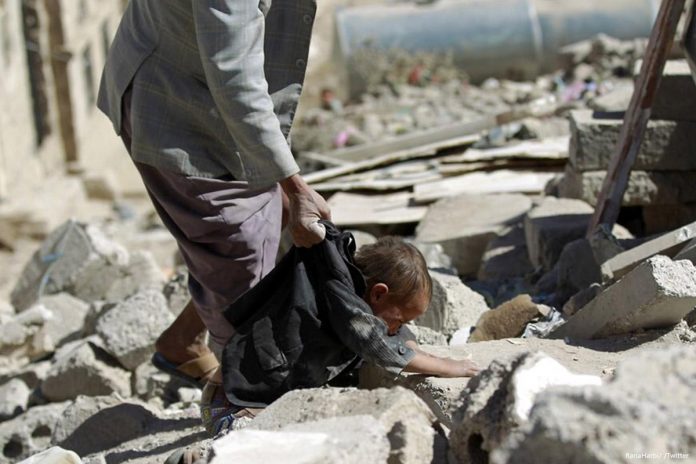Conflict in Yemen seems to have no end in sight. The bloodbath continues unabated as the country losing both men and material in the complex conflict. While the conflict has become a source of gain for some parties, it has become a source of pain for many.
Yemen’s fierce civil war has taken a devastating toll of its children, the assets of the country and its future as well. The hot civil war of many years has turned Yemen into a smithy whose fuel has become the country’s children, women and the civilians. More than 6000 children have been killed or injured in the violence since it began. Nearly two million children are suffering from acute malnutrition. In this tussle, the children are losing everything from education to life and two million children are out of school.
What started as a civil war, between the Houthi fighters of the Shia sect and the government of Yemen, has turned into a geopolitical tussle between Shia dominated Iran and Sunni dominated Saudi Arabia. Both these countries seek to become the leader of the Islamic world and lead the direction of the Middle East. This tough fight for influence has worsened the situation in Yemen and sparked the strategic competition between the two countries, both of whom are fighting for the control of Yemen’s capital city Sana’a. While Saudi Arabia has intervened under the pretext of containing Iranian influence in Yemen, Iran is purportedly involved in backing the Houthi forces.
Interestingly Iran and Saudi Arabia are getting a happy hunting ground in Yemen to demonstrate their might against each other. This occurs at the expense of the people of Yemen who are losing at every front: education, economy, and politics. By beating Saudi Arabia in Yemen through Houthi forces, Iran can have an advantageous position and can score some brownie points. Saudi Arabia would like to defeat the Houthi camp and restore ousted president Abed Rabbo Mansour Hadi’s government in Yemen. That will leave it with an upper hand over Iran and may undermine Iran’s influence.
This political rivalry is proving costly for the Yemenis. Air strikes carried out by Saudi Arabia and its coalition partners have killed and wounded thousands of civilians, often in indiscriminate attacks, human rights groups say. More than 16,000 civilians have been killed and injured for the last three years. About three million people have been displaced. Famine and cholera (the largest outbreak in history) threaten the life of about 22 million people. At least one million Yemenis have contracted cholera, posing the threat of a global epidemic.
Furthermore, the war in Yemen has undermined the country’s economic development, not only widening the gap between the regional countries and developed economies but also leaving it behind the emerging economies. Who are the direct victims of the no or low economic development? The emphatic answer is the Yemenis. Their resources, both human and non- human, are fast disappearing. As a result, economic backwardness and chaos are controlling Yemen and making it a strategic battlefield for military powers in the region.
The Yemenis are setting a stage for anarchy in their homeland: their institutions and other civic facilities are getting destroyed in the complex war. Their hospitals, schools, factories, water mains, sewage facilities, bridges and roads have been destroyed in the bombing attacks. With institutions no more or weakened, the Yemen society is getting caught in the mire of corruption, poverty, unemployment and illiteracy. In such a situation, Yemen is all set for anarchy.
Meanwhile, Al-Qaeda in the Arabian Peninsula and the rival affiliates of the ISIS have taken full advantage of the crisis. The two non-state actors have seized some territories in the south of Yemen and have carried out attacks. All this is happening at the expense of the welfare of the people of Yemen and their resources. With their own house in disorder, the Yemenis see foreign influence easily deepening roots in their country. Such a state of affairs will add fuel to fire.
Moreover, this Middle Eastern country sits on the Bab al-Man dab strait, a narrow waterway linking the Red Sea with the Gulf of Aden, through which much of the world’s oil shipments pass. This is a strategic location both for the regional and the global trade. But the crisis in the country threatens this strategic route and as such the world trade. If this trade route is blocked, a wider regional conflict and an active intervention by the major powers of the world can never be ruled out. Such a situation can prove the last nail in the coffin of the Yemenis: unstable Yemen is an invitation to regional tensions and a cause of concern for the Western powers in particular.
In view of the foregoing worst scenario in Yemen, it can be said that the Yemenis are ignoring the conflict at their own peril. They need to remove the trouble, relieve the tensions and protect their country. They need to save themselves from becoming pawns in the regional power struggle between Saudi Arabia and Iran. The Houthi forces must accept the responsibility for becoming a cause of the war and ruining the country through their actions.
The longer the war goes on, the more complex it will become to find a solution to the conflict. Unless the warring parties cease hostilities and come on a negotiation table to find a lasting solution to the crisis, Yemen will continue to face decay and devastation. For a solution, a mediator like the UN, Oman or Kuwait can be used. A deal is needed. It must involve a phase-wise pull out of the Houthi forces from Sana’a and the Saudi border. Saudi Arabia needs to stop aerial bombings and help end the calamity facing the Yemenis.
An inclusive government is needed in Yemen with fair power-sharing structure among various sections of the country. Besides, all provinces and areas of the country must get representation in the governance setup. Above all, tolerance for the various shades of religious views is immediately needed. Social and religious discrimination and political marginalization must stop. A peace offer to the Houthi camp and a promise of power-sharing can prove a game changer, giving peace a chance in Yemen. In such a situation, Yemen can rebuild itself and the sun of welfare for all sections of the Yemenis can rise in the war-torn country.

Sheikh Shabir Kulgami is a Kashmiri (Indian) political commentator, analyst and columnist. He writes extensively on South Asia.


